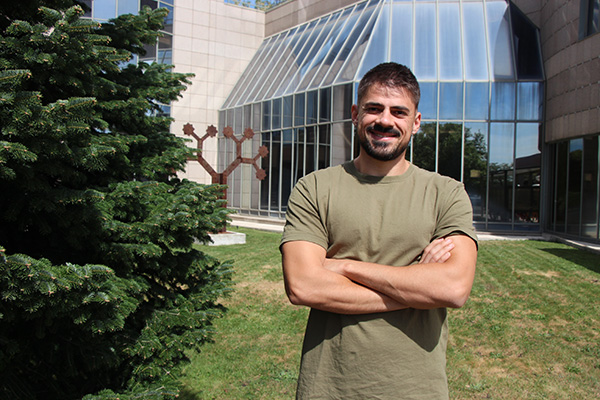The researcher has been working with Oksana Chubykalo-Fesenko at Group of Nanomagnetism and Magnetization Processes
 "Modelling of magnetic textures in thermal gradients". This is the tile of Elías Saugar Gotor's PhD thesis. He is defending his work on May, 4 at the Institute of Materials Sciences of Madrid (ICMM), CSIC, after working on it for four years along with Oksana Chubykalo-Fesenko, his PhD director and senior scientist at Group of Nanomagnetism and Magnetization Processes. "This thesis focuses on the interaction of magnetism and temperature, motivated by finding strategies to improve existing thermoelectric devices. In this context, thermal gradients can convert heat, charge and spin currents," explains Saugar about his work.
"Modelling of magnetic textures in thermal gradients". This is the tile of Elías Saugar Gotor's PhD thesis. He is defending his work on May, 4 at the Institute of Materials Sciences of Madrid (ICMM), CSIC, after working on it for four years along with Oksana Chubykalo-Fesenko, his PhD director and senior scientist at Group of Nanomagnetism and Magnetization Processes. "This thesis focuses on the interaction of magnetism and temperature, motivated by finding strategies to improve existing thermoelectric devices. In this context, thermal gradients can convert heat, charge and spin currents," explains Saugar about his work.
In the abstract of his thesis, he says that many research activities "focus on controlling nontrivial magnetisation configurations such as domain walls (DWs) and skyrmions due to their potential for new logic and memory devices", and he explores "the behaviour of different magnetic structures, such as domain walls and skyrmions, under a thermal gradient in perpendicularly magnetised Co-based thin films". "We use the micromagnetic approach based on the Landau-Lifshitz-Bloch (LLB) equation to address this topic, allowing us to model magnetic systems' dynamics at high temperatures", he concludes. Here he answer some questions about his research and talks about his academic path: "It wasn't in my plan to become a scientist. However, my job career took a turn some years ago, and I ended up writing a thesis. Life is unpredictable!."
Why did you choose ICMM for your PhD?
I ended up here by chance, and I don't regret it. It's a great place to do the PhD with magnificent scientists and professionals. Indeed, in my group, the ambiance is excellent, and they took me in as one of their right from the start.
What are the lessons you have learned here? Which one do you value the most?
Besides scientific knowledge, two things have marked me. The first is that one is incapable of learning everything. The second is to have patience and be constant. In the end, if you make an effort, the work comes out.
How do you think this experience will contribute to your training and future?
The non-scientific experience acquired here will help me to adapt to new situations and face new challenges.
What are your plans once you finish your PhD?
I'm still thinking. I haven't even had time to think about it. I will let myself go and see where the current takes me, as I have done so far.
-- Ángela R. Bonachera - ICMM Communication Unit --